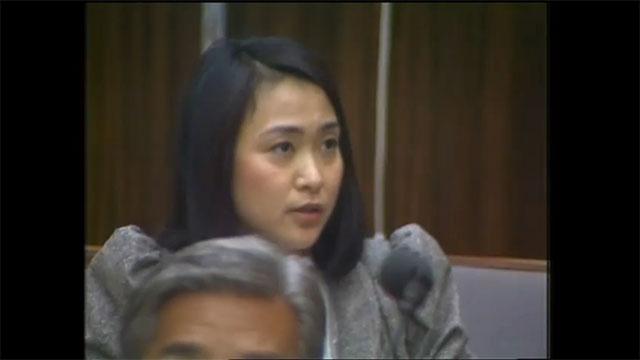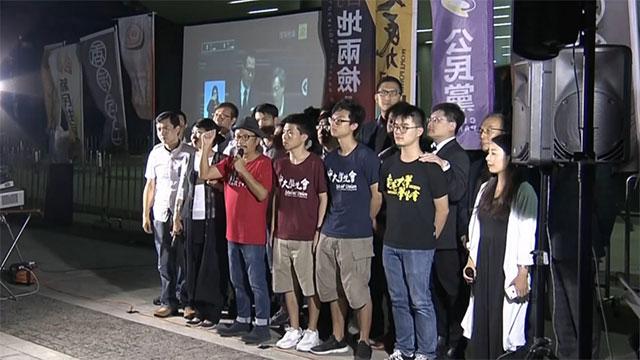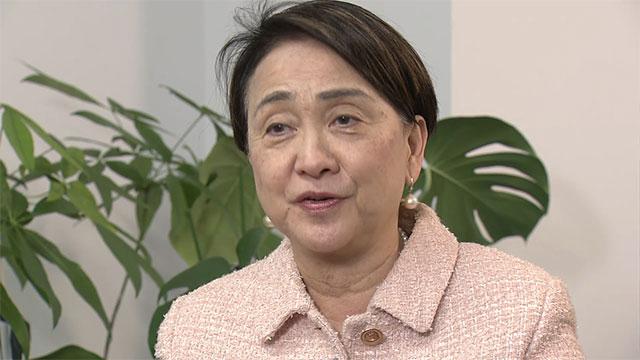Questioning the Iron Lady
Emily Lau was a politician in the Legislative Council of the Hong Kong Special Administrative Region for 25 years. In the four years up to her 2016 retirement, she was the Democratic Party leader.
Before entering politics, Lau was a journalist. When British Prime Minister Margaret Thatcher held a press conference in Hong Kong in 1984, Lau asked, "Prime Minister, on Wednesday you signed an agreement with China promising to deliver over five million people into the hands of a communist dictatorship. Is this morally defensible, or is it really true that in international politics, the highest form of morality is one's own national interest?"
Thatcher answered that everyone in Hong Kong was happy with the Sino–British Joint Declaration signed between China and the UK.
Lau has paid close attention to democracy during her careers in media and politics.

Her view on "one country, two systems"
Why did you decide to participate in politics in 1991?
A: In 1991, Hong Kong was under British colonial rule, and it was the first time that people were allowed to vote to choose members of the legislative council, which is like Hong Kong’s parliament. At that time, the council had 60 seats. But only 18 were allowed to be chosen by the people. And I was a journalist at the time and I believed in democracy, so when the opportunity came, I decided to run. And I was quite confident that I’d win.
During your career in politics, how did you feel about the situation of democracy in Hong Kong?
A: We are still struggling for democracy. The policies of President Xi Jinping of the People’s Republic of China are now getting very harsh. And some Hong Kong people, particularly younger ones, they want to leave, they want to immigrate to places which are democratic and free. So it’s a very worrying situation. But I think most people will not leave and cannot leave. So we have to continue our struggle but most of us believe in doing it in a peaceful and non-violent way. I don’t support the use of violence.
Some say that young people in Hong Kong are losing interest in politics because Beijing is interfering more and more.
A: Well, I think it is true that many young people -- or not so young -- don’ t have much interest in politics. They know or think it is useless, because Beijing will control it. Beijing will not let us have our way and run Hong Kong the way people want. So these people feel, "What is the point?" -- that going into politics will make them puppets of Beijing.
And some young people, although I think is a small number, they don’t want to be Chinese. I say, "What country are you?" They say, "I am Hong Kong country." I say "What? Hong Kong is not a country." "But I’m not Chinese," they say. So of course, Beijing doesn’t like it. And some say they want to fight for independence. That makes Beijing even angry. So that’s why the atmosphere is very tense. And Beijing will tell all the universities, the news organizations, the NGOs, that nobody should mention independents. That’s their duty.
How do you feel about "one country, two systems"?
A: Over the last 10 years or more, Beijing keeps interfering in our elections, in the news media, in universities, in the entertainment industry, you name it. So it’s very bad. The people feel, oh, you don’t keep your promise. You said something, but you don’t do it. People just feel that China has no respect for "one country, two systems" -- no respect for our rule of law. So we have to keep telling China to stop it.

If the international society knows about the current situation, will China give up?
A: I think that China will listen. It will not immediate say, "OK, I will do what you want" of course. Also, I think Hong Kong is still useful to Beijing. We still serve some purpose for them. And some of the leaders in Beijing think that it’s good to have Hong Kong as an international business and financial center. There are many transactions going on in Hong Kong which affect the mainland. So in order to preserve that, they must respect the rule of law and respect the rights of the people.
What is your ideal future of Hong Kong? Independence or keeping "one country, two systems?"
A: I don’t know. I don’t have a crystal ball. And some of the young people in Hong Kong ask us what’s going to happen in 2047, because this "one country, two systems" is not going to continue forever. It’s only for 50 years. So in 2047, something has to happen. And we continue or we finish, become one country, one system. So what’s going to happen in 2047, I don’t know.
But what will happen then I think depends on how hard we try in the next 5, 10 years to secure the lifestyle we want, and also to engage Beijing. We need to talk to Beijing. But they are not interested. They don’t want a dialogue with us. But I think that Hong Kong people, younger generation, pro-democracy politicians, should engage Beijing in dialogue. Tell them what we want. And most people do not want independents. They just want Beijing to leave us alone -- "one country, two systems."
Obstacles for women: Family and political party
You became the first woman to won in a constituency in 1991. And even now, female politicians are a minority around the world, especially in Asian countries. What obstacles exist for women to participate in politics?
A: Family. I don’t know about family in Japan, but women’s status is still quite low. In fact, I think many families don’t even want men to stand for election. Women, definitely not. Why would you want to? You have to do the housework, to look after the baby, to look after the sick, to look after grandma. And they don’t say the same about men. So it’s family. Many women do not have a chance to become a candidate.
The other problem, of course, is the political party. Many of them were nominated by men. So they keep picking men. And so there is, I think, really a need for a revolution there. Not violence, but really, we need men’s support to do that. So I hope there are more liberal-minded men who understand the importance of having more female representation.
Have you experienced difficulties in the political arena because you are a woman?
A: Ah, not really. Never. You know what you are about. So when you speak, you speak with confidence, and you know what you are talking about, and you let them know, this is business. Don’t mess with me. Don’t appear weak. Because it is up to you. You invite people to come interfere. You have to show, "Hey, I know what we are talking about. Don’t mess with me." So I think we need to show that. Whether we are men or women, but women in particular because some stupid people tend to have the impression that we are weak. So you have to tell them in the beginning that you are not weak.
You became a female party leader. Do you have any advice for other women who aim to take on leadership roles?
I think that it is very important for women or men who want to become leaders to understand what leadership qualities are and what it will take to engage with members so that you can get their support. You cannot just say, "Just follow me." You cannot be like that.

Do you expect change if more women participate in politics?
A: I think so. I think if there are more women in politics as I say, if half of the people who make decisions are women, I think the policies will be different. Because the things that women think and the things men think are different. And women care about the welfare of children, healthcare, so if women become leaders, I think they will pay more attention to changing the emphasis of healthcare systems, education. Even on defense, high-tech and finance, women have a different approach. So I’m sure the whole country, the whole place, will benefit if women can also participate. And men have tried it so long and people are unhappy, so I think we can give women a chance.
Lau says that one of the reasons she stepped down from politics is her belief that young people should take part in it more. She emphasizes that she will never step down from the fight for democracy and human rights, saying, “I’m still busy as ever. And I love it.”
